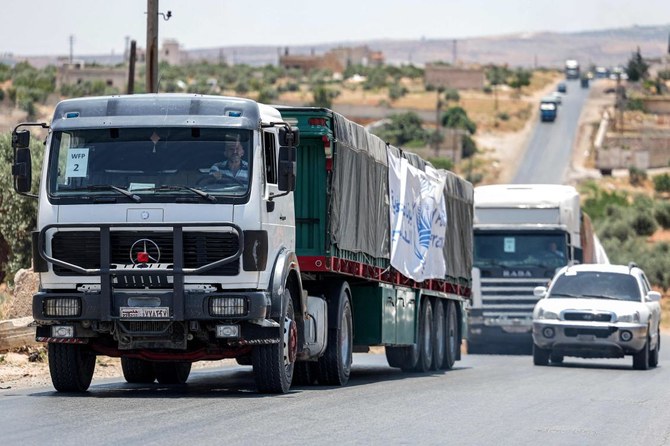JEDDAH: A UN aid convoy aid crossed from Assad regime-controlled northwest Syria to rebel-held areas on Friday for the first time since two devastating earthquakes in February.
The 10-truck convoy reached rebel-held Al-Nayrab in Idlib province from the direction of regime-held Saraqib, headed for storage facilities near the Turkish border.
The trucks were covered with banners bearing the name and logo of the UN World Food Programme. The last such convoy was in January.
The UN Office for the Coordination of Humanitarian Affairs said: “The cross-line convoy is underway, carrying UN humanitarian supplies.”
Two earthquakes on Feb. 6 devastated parts of Turkiye and Syria, including areas of the Idlib region that are controlled by jihadist group Hayat Tahrir Al-Sham. About three million people, most of whom have been displaced by Syria’s war, live in militants-controlled parts of the Idlib region.
Bashar Assad’s regime said in February it had approved the delivery of humanitarian aid directly from government-held territory to rebel areas, but militant chief Abu Mohammed Al-Jolani refused assistance through such a route.
The UN largely delivers relief to Syria's northwest via Turkiye through the Bab al-Hawa crossing, the only way for aid to enter without Damascus’s involvement.
The number of UN-approved crossings has shrunk from four in 2014 after years of pressure from regime allies China and Russia at the UN Security Council.
The UN chief said in February that Assad had agreed to open the Bab Al-Salama and Al-Rai crossings from Turkiye to allow aid to enter rebel-held areas for an initial period of three months.
Syria in May extended access for those two crossings, which are operated by Turkish-backed rebels, for another three months.
Syria's war has killed more than half a million people and displaced millions since erupting in 2011 with a brutal crackdown on anti-government protests. Despite periodic exchanges of deadly fire, including some in recent days, a ceasefire deal brokered by Moscow and Ankara has largely held in the northwest since March 2020.




























